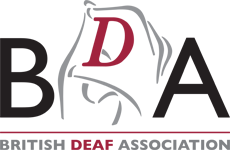RESEARCH & CONSULTATIONS
The BDA undertakes research into the experiences of Deaf people in different regions and countries from across the UK, as well as publishing policy responses to key policy developments and consultations that impact on Deaf people. Please click on the links below to access the relevant document.
Publications
BDA reports
- Access to Council Services for Deaf People in Birmingham
- Access to Council Services for Older Deaf People in England and Wales
- Access to Services for Deaf people in Derby
- BDA response to Scottish Government consultation on the Draft BSL National Plan 2017-2023
- Deaf Organisations and Funding
- Early Years Intervention for Deaf Children in Northern Ireland
- Legal Status for BSL and ISL - 2014
- Response to the Consultation on the proposed British Sign Language Bill, Scotland
- Throw away the key? - How Britain’s prisons don’t rehabilitate Deaf people
- Transforming Deaf People's Lives
- UNCRPD - Response to ODI - Draft UK Initial Report on the UNCRPD - 2011
- UNCRPD - Response to ODI - Draft UK Initial Report on the UNCRPD - 2013
- UNCRPD - Supplementary Report - June 2014
- UNCRPD - Alternative Report - Implementation of the UNCRPD - February 2017
- UNCRPD - BDA response to UK Government Report to UNCRPD - July 2017
- Summary of the BDA Draft Position Statement on the Language Acquisition of Deaf Children (For BSL, click here)
- British Deaf Association’s Position Statement on the Language Acquisition of Deaf Children (For BSL, click here)
BSL Charter
Government related documents
- Response to the Consultation: "Fulfilling Potential"
- Disability Living Allowance (DLA) for Deaf People
- The Scottish Government's Consultation paper: “A Governance Review: Empowering Teachers and Communities to Achieve Excellence and Equity (Fairness) in Education”
- Scottish Independence Referendum and the Deaf Community in Scotland
- Submission to Scottish Parliament - Attainment of school pupils with a sensory impairment - To the Scottish Parliament's Education and Culture Committee
- Sign Language Framework Response - Northern Ireland BSL/ISL Framework
- Consultation on the Draft BSL National Plan 2017-2023 - Scotland
Regional Reports: Health
- Deaf Community Speaks Up On Local Health Services - Healthwatch Leicester
- Access to GPs in North Derbyshire
- Response to Consultation on the mental Health Strategy for Scotland
- NHS BSL/English Interpreting provision within Health Settings in Scotland
- Improving Access for BSL Users - Checklists for Health Boards and NHS Trusts
- Access to Health Services for Older People In England and Wales
- Report on Health Services Provision to BSL Users in Scotland
- Access and Inclusion (Health) Review: Impact and influence on health care services in Scotland
- Dementia Friendly Communities in Scotland - Report 3
- BSL (Scotland) Act 2015: Scottish NHS Health Boards and NHS 24 - Summary of Progress being made with BSL Plans
- Executive Summary report: Deaf people with dementia and care homes in Scotland (PDF)
- Full report: Deaf people with dementia and care homes in Scotland (PDF)
Regional Reports: Local Authorities
- Access to local services in Newport and Monmouthshire for Deaf and hard of hearing people
- Accessing Public Services - Issues for Deaf People - London Boroughs
- Access & Inclusion - A Report on Hate Crime in Scotland’s Deaf Community
- Access to Emergency Departments in Northern Ireland
- Access to Justice Consultation - Northern Ireland
- Regional Review of Communication Support Services - Northern Ireland
- Deaf People's Access to Local Service Providers - Wales
- Access for local Deaf People to Local Health Board (LHB) Services - South Wales
- Audiology Seminar Report 2019- Northern Ireland
- BSL (Scotland) Act 2015: Scottish Local Authorities - Summary of Progress being made with BSL Plans
- BSL Scotland Act 2015: Scottish Deaf BSL Community - Summary of Progress being made with Local Authorities’ BSL Plans through BSL Roadshows (February 2022)
